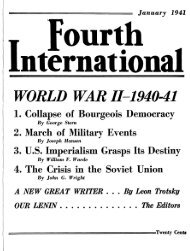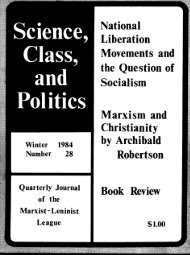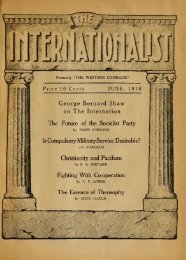The Stalin school of falsification - Marxists Internet Archive
The Stalin school of falsification - Marxists Internet Archive
The Stalin school of falsification - Marxists Internet Archive
You also want an ePaper? Increase the reach of your titles
YUMPU automatically turns print PDFs into web optimized ePapers that Google loves.
<strong>Stalin</strong> School <strong>of</strong> Falsification -- Chapter 11<br />
Petrograd to the peoples <strong>of</strong> the whole world, summoning them to compel their own governments to<br />
terminate the slaughter. This manifesto, if it reaches the broad masses, will undoubtedly recall hundreds<br />
and thousands <strong>of</strong> workers to the forgotten slogan:<br />
'Workers <strong>of</strong> the World, Unite!' ,<br />
How did Lenin evaluate the manifesto <strong>of</strong> the defensists? In his April 4 speech, from which we have<br />
already quoted, he said: "<strong>The</strong> manifesto <strong>of</strong> the Soviet <strong>of</strong> Workers' Deputies<br />
there isn't a word in it imbued with class-consciousness. <strong>The</strong>re is nothing to it but phrase-mongering."<br />
(<strong>The</strong> March 1917 Party Conference. Session <strong>of</strong> April 4. "Report by comrade Lenin.")<br />
<strong>The</strong>se words are directed entirely against <strong>Stalin</strong>. That is why the protocols <strong>of</strong> the March Conference are<br />
kept hidden from the party.<br />
15. Since he was carrying through the policy <strong>of</strong> the Left Mensheviks in relation to the Provisional<br />
Government and the war, <strong>Stalin</strong> had no reason whatever for rejecting unification with the Mensheviks.<br />
Here is how he expressed himself on this question at the self-same March 1917 Conference. We quote<br />
the protocols verbatim:<br />
"Order <strong>of</strong> the da~-Tseretelli's proposal for unification.<br />
"STALIN:We ought to go. It is necessary to define our proposals as to the terms <strong>of</strong> unification.<br />
Unification is possible along the lines <strong>of</strong> Zimmerwald-Kienthal."<br />
At this, even Molotov expressed his doubts; to be sure, not very articulately. <strong>Stalin</strong> replied in refutation:<br />
"<strong>The</strong>re is no use running ahead and anticipating disagreements. <strong>The</strong>re is no party life without<br />
disagreements. We will live down trivial disagreements within the party." (<strong>The</strong> March 1917 Party<br />
Conference. Session <strong>of</strong> April 1.)<br />
<strong>The</strong>se few words speak louder than volumes. <strong>The</strong>y serve to establish the thoughts upon which <strong>Stalin</strong> fed<br />
during the war years and they attest with juridical precision that <strong>Stalin</strong>'s Zimmerwaldism was <strong>of</strong> the same<br />
brand as Tseretelli's Zimmerwaldism. Here, once again, there is not even a hint <strong>of</strong> that ideological<br />
irreconcilability, which was put on by <strong>Stalin</strong> as a false mask several years later, in the interests <strong>of</strong> the<br />
apparatus struggle. On the contrary, Menshevism and Bolshevism appear to <strong>Stalin</strong> at the end <strong>of</strong> March<br />
1917 as shades <strong>of</strong> thought that could abide in a single party. Disagreements with TsereteHi <strong>Stalin</strong> calls<br />
"trivial," which can be "lived down" in the framework <strong>of</strong> a single organization. We can gather from this<br />
how becoming it is for <strong>Stalin</strong> to condemn in retrospect Trotsky's conciliationist attitude to the Left<br />
Mensheviks . . . in 1918.<br />
16. With such a position, <strong>Stalin</strong>, in the nature <strong>of</strong> things, could not counterpose anything serious to the<br />
S.R.'s and the Mensheviks in the Executive Committee <strong>of</strong> the Soviet, which, on his arrival, he entered as<br />
a representative <strong>of</strong> the party. <strong>The</strong>re has not remained in the minutes or in the press a single proposal,<br />
declaration or protest in which <strong>Stalin</strong> in any distinguishable manner counterposed the Bolshevik point <strong>of</strong><br />
view to the flunkeyism <strong>of</strong> the "revolutionary democracy" toward the bourgeoisie. One <strong>of</strong> the chroniclers<br />
<strong>of</strong> that period, the non-party semi-defensist Sukhanov, the author <strong>of</strong> the above -- mentioned manifesto to<br />
the toilers <strong>of</strong> the whole world, says in his Note* on the Rei'olt_tion:<br />
"Among the Bolsheviks, besides Kamenev, there appeared in the Executive Committee <strong>of</strong> the Soviets in<br />
http://www.marxists.org/archive/trotsky/works/1937-st2/sf11.htm (7 <strong>of</strong> 12) [06/06/2002 15:07:13]

















